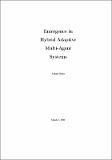| dc.contributor.advisor | Piiroinen, Petri | |
| dc.contributor.author | Burke, Richard | |
| dc.date.accessioned | 2021-03-12T08:53:26Z | |
| dc.date.available | 2021-03-12T08:53:26Z | |
| dc.date.issued | 2021-03-10 | |
| dc.identifier.uri | http://hdl.handle.net/10379/16601 | |
| dc.description.abstract | This thesis investigates a number of hybrid adaptive strategies to drive multi-agent systems from initial states of disorder towards consensus or favourable configurations. The dynamics of the agents and their communicative links, represented by nonlinear ODEs, may be visualised as evolving networks. Numerical experiments supplement the mathematical models presented. | en_IE |
| dc.publisher | NUI Galway | |
| dc.rights | Attribution-NonCommercial-NoDerivs 3.0 Ireland | |
| dc.rights.uri | https://creativecommons.org/licenses/by-nc-nd/3.0/ie/ | |
| dc.subject | Multi-agent systems | en_IE |
| dc.subject | consensus | en_IE |
| dc.subject | flocking | en_IE |
| dc.subject | complex networks | en_IE |
| dc.subject | Mathematics, Statistics and Applied Mathematics | en_IE |
| dc.subject | Mathematics | en_IE |
| dc.subject | Applied Mathematics | en_IE |
| dc.subject | Science and Engineering | en_IE |
| dc.title | Emergence in hybrid adaptive multi-agent systems | en_IE |
| dc.type | Thesis | en |
| dc.contributor.funder | Hardiman Research Scholarship, National University of Ireland Galway | en_IE |
| dc.local.note | Mathematical models are presented to model an ensemble of agents communicating with one another and changing their relative positions in order to reach either agreement or some favourable flocking configuration. Analysis and experiments are performed to discover both the communicative and spacial relationships between the agents. | en_IE |
| dc.local.final | Yes | en_IE |
| nui.item.downloads | 99 | |


